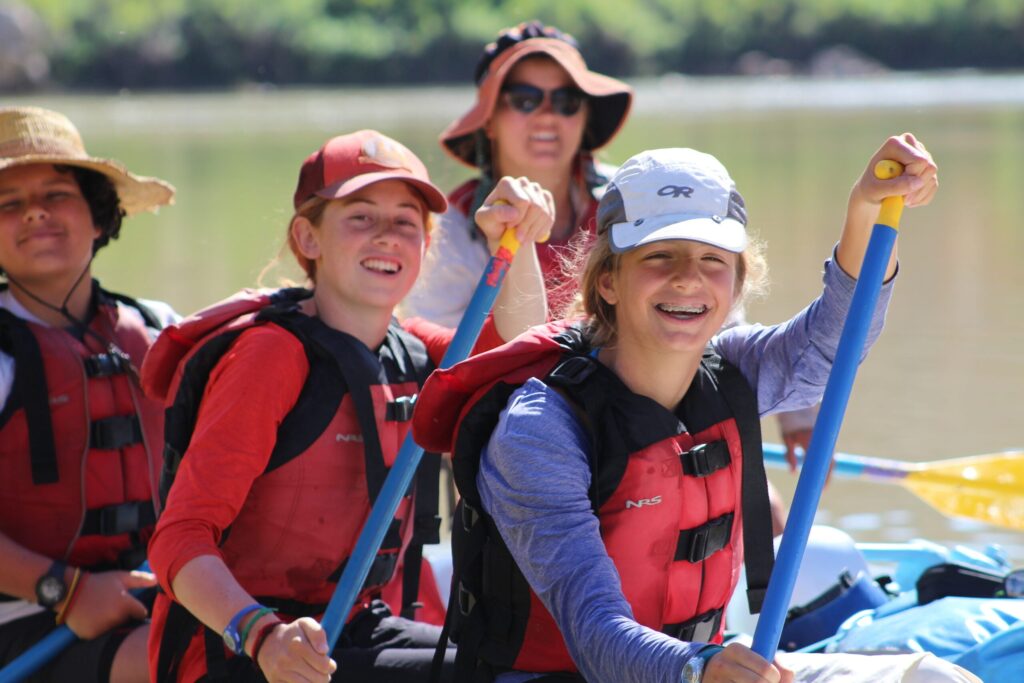On January 24, Outside will join Outward Bound and thousands of young people and their families to take The Reset Pledge, to step away from screens and reconnect with nature and each other
Teens enjoy a Southwest rafting trip with Outward Bound USA (Photo: Outward Bound USA)
Published November 6, 2025 03:45AM
For 60 years, Outward Bound has run wilderness programs aimed at outdoor skills to foster personal growth. Over the decades, it’s pivoted to meet the needs of youth and adults. Today, the organization serves over 35,000 young people. The current crisis? We’ve traded time outdoors for screens.
Ginger Naylor joined Outward Bound in 2010 with a strong belief in its mission. At the time, she needed it for her own teens. Now, as the organization’s CEO, Naylor will spearhead a movement to step away from screens and reconnect with nature, contributing to a collective goal of 10 million-plus hours of real-world connection.
On January 24, Outside will join Outward Bound and thousands of young people and their families to take The Reset Pledge.
Outside caught up with Naylor to learn more.

OUTSIDE: The Reset is much more than a national day to get teens outside. Tell us more.
Ginger Naylor: Earlier last year, we all started having conversations about what’s going on with kids right now. We’re talking to teachers and their parents. The conversation everyone is having is about how much time kids are spending on their screens and how that is impacting their mental health. This is one of the first generations of kids who have moved from a play-based childhood—where you’re outside, you’re playing, you’re experiencing nature—to a screen-based childhood, where you’re sitting indoors and staring at a screen and you’re having these disembodied experiences with other people. Our kids are missing developmental milestones because of it.
Outward Bound hopes to use its long history to spark a moment, to create a national movement of folks who say, “We’re going to make the choice to step away from screens.” Whether it’s for a day, a week, or a month, the organization hopes to help youth and their families reconnect with nature and each other.
January 24 is the launch date, and that’s when we’re going to ask folks to come online, and make a commitment. It’s not about what you’re giving up; it’s about what you’re getting back. We’re not focused solely on a screen break. We’re trying to get people to think about what they get back when they make a different choice. Humans have spent 90 percent of our evolutionary life cycle, over hundreds of thousands of years, deeply connected to the outdoors. We evolved alongside the outdoors. This is the first time that we’ve locked ourselves inside and that we are not having this constant human connection and nature connection, and it’s impacting us.
Let’s talk teen mental health, specifically the problems you’re seeing in your schools.
When I was leading a school, one of the things our instructors did when the kids come in was collect their meds. When I started working at Outward Bound in 2010, those bags were usually a Ziploc bag with two or three medications. By the time I left my role as an executive director in one of the schools, those med bags were huge. Every kid is struggling; it’s just across the board, and you can see it in their prescriptions. You can see it in their behavior. There are all sorts of reports about what’s happening, but there seems to be a really clear connection to how much time we’re spending disconnected from each other and the outdoors.
Our kids are anxious right now. Youth today spend less than ten minutes a day outside. Whatever we can do to support them in finding healthy ways to connect, I think it’s a really good thing. There’s so much research behind the forest bathing trend, when you go outside and disconnect. Your nervous system comes down. Everything slows down. Your thoughts become clearer. Your creativity boosts. There are so many good things that happen from (though it sounds silly) the whole touching grass idea.
Tools like social media have been trapping people, but you’re going to use them to inspire people. How?
We have an opportunity right now to step in and say, “Hey, let’s find a way to use this that feels really positive, because tech is good.” I think it just all comes back to what we said earlier, that it’s not about what you’re giving up, but what you’re getting back. It’s time to focus on what you get back from disconnecting. When I was a teenager, nobody was reporting everything I was doing. I have a lot of empathy for what our young people are going through today. And I think as adults, we all do, right? And so I think that’s where, to me, The Reset is so important, because this is the spark. Here’s how you can take action. Here’s something you can do.
I think we all feel really powerless. We’re looking for ways to help and to come together and talk about it. I’m hoping that The Reset launches a movement that lasts.
Editor’s note: This interview has been edited for clarity and brevity.


